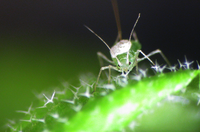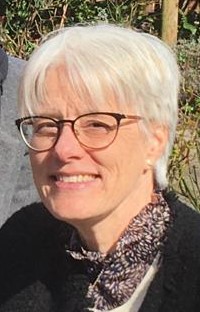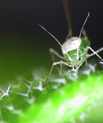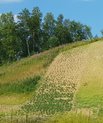Welcome to N'TOP

The project is funded by NKJ
Contact NKJ
Email us: nkj@slu.se
Give us a call: +46 70 672 75 44
Mail us: NKJ c/o SLU
Department of Southern Swedish Forest Research Centre
Box 190, 234 22 Lomma
Sweden
About the network

While potato production is declining in most of Europe, Denmark has doubled its commercial potato farming from 2006 to cover more than 60.000 ha in 2020, and in the Netherlands, potatoes constitute almost 25 percent of agricultural land use (~160,000 ha). In the Nordic countries commercial production is confined to the south of Finland, Sweden, Norway, and Jutland in Denmark. In the North, potato growth mainly happens at the scale of single households and smallholder farms. However, this tradition is locally threatened, and crop production in Northern Sweden has decreased with 50 percent since the mid-1990’ies.
EU farming legislation already takes strong measures to reduce pesticide use, however commercial potato farming at the same time faces problems with pathogens and pests that expand northward due to changed weather regimes; thus, farming conditions may drastically change in the years to come, with implication for the already established potato value chain. Longer growing seasons caused by climate change may on the other hand also swift the commercial interest towards potato growth in Northern Scandinavia as well as in Atlantic territories including Greenland, Island, and the Faeroe Islands.
Knowledge on advanced breeding techniques and sophisticated integrated pest management procedures have mainly been developed for southern latitudes. To support a sound expansion strategy for future potato farming in northern parts of Europe, the N’TOP-network will gather researchers and stakeholders with expertice relevant to the potato value chain. We have the following goals:
Map the range of potato farming, the current pest and disease monitoring efforts, and the IPM implementations in Nordic countries.
Explore the potential to expand potato growth commercially and privately in the North European region.
Create opportunities for stakeholders and researchers along the potato value chain to communicate and exchange ideas, knowledge, and protocols to build a knowledge-based strategy for the management of current and newly emerging pests and diseases and expansion of potato farming to arable areas in the North.
The N’TOP-network is initiated by partners from Sweden, Finland, Denmark, and the Netherlands:
Literature
References (click on the year to get to the source):
1 Eriksson D., Carlson-Nilsson U., Ortiz R., Andreasson E. (2016) Overview and Breeding Strategies of Tabnle Potato Production in Sweden and the Feno-Scandinavian Region. Potato Research
2 Danmarks Statistik (2021) AFG5: Det dyrkede areal efter område, enhed og afgrøde.
3 Potatopro.com statistics (2021)
4 Öberg E. (2015) Utvecklingen av trädgårdsnäringen I Norrbotten och Övriga Norrland. Öjebyn AgroPark
5 Withworth J. (2020) EU plans cut to antimicrobial and pesticide use in Farm to Fork strategy. Food Safety News May 21, 2020
6 Erickson, B. (2018). EU to ban neonicotinoid pesticides outdoors. Chemical & Engineering News, 96: 16. ISSN 0009-2347
7 EU Directive 2009/128/EC (2009)
8 The CAP and pesticides (2021) EU web information on pesticides in agriculture. For a correct use of pesticides to minimise health or environmental risks. With links to other resources.
9 van den Heuvel R (2019) AGRICULTURE VALUE CHAIN STUDY PUNJAB, PAKISTAN. More yield, more outlets, more income for Pakistan. Opportunities for Dutch companies & institutes
10 European Environment Agency (EU) webpage (2016) Trend in the number of frost-free days
Core management group
Project manager: Dr. Benedicte R. Albrectsen, Dept. Plant Physiology, Umeå Plant Science Centre, Umeå University, Linnaeus v. 6, 90736 UMEÅ, Sweden. < benedicte.albrectsen(@)umu.se>
Partners:
- Jens Grønbech Hansen, Dept. of Agroecology, Aarhus University, Blichers Allé 20, Postboks 50, DK-8830 Tjele, Denmark. <jensg.hansen(@)agro.au.dk>
- Dr. Karen J. Kloth, Lab. of Entomology, Wageningen University & Research, Postbus 16, 6700 AA Wageningen, the Netherlands. <karen.kloth(@)wur.nl>
- Dr. Erland Liljeroth, Department of Plant Protection Biology, Swedish University of Agricultural Sciences, Box 102, SE-230 53 Alnarp, Sweden. <erland.liljeroth(@)agro.au.dk>
- Dr. Kristiina Mäkinen, Department of Microbiology, University of Helsinki, P.O.Box 56, 00014 University of Helsinki, Finland. <kristiina.makinen(@)helsinki.fi>
Contact

E: mail: benedicte.albrectsen@umu.se
Phone: +46 90 786 70 11
Research fellow at Department of Plant Physiology Units: Umeå Plant Science Centre - internal staff KB. K3 (Fys. Bot.), Artedigränd 7, Fysiologisk botanik, UPSC, KB. K3 (B3.44.51). Umeå universitet, 901 87 Umeå

